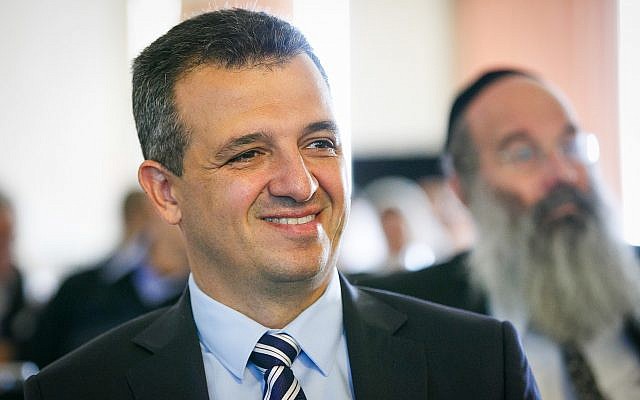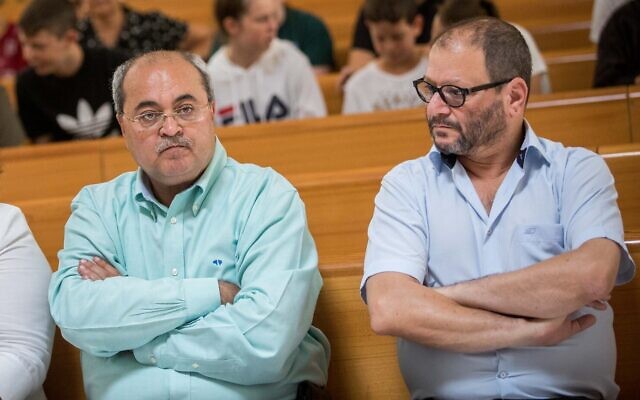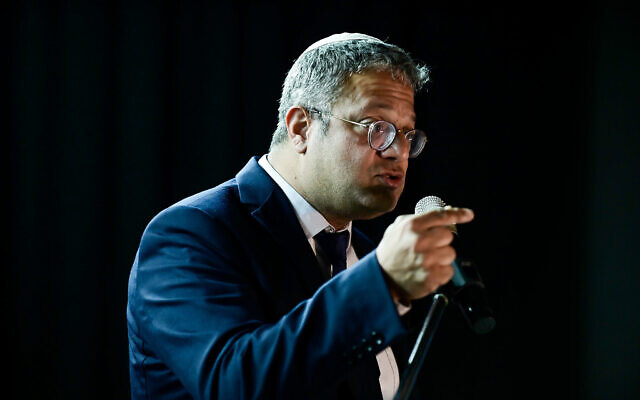The mayor of Ramat Gan said Wednesday that despite outrage over a campaign poster by far-right party Otzma Yehudit calling for banishing some members of an Arab majority party as “enemies,” it is up to the Central Elections Committee to decide if it must be removed.
The billboard is displayed on a wall overlooking the Ayalon highway, a major artery passing by Tel Aviv and Ramat Gan.
Ramat Gan Mayor Carmel Shama-Hacohen told Army Radio that although the poster is “unpleasant” he would not take any action unless a petition is filed and an order given to take it down.
Otzma Yehudit, a member of the far-right alliance led by the Religious Zionism party, posted the banner on Monday, eve of Rosh Hashanah, the Jewish New Year.
The poster shows the faces of Hadash-Ta’al party leader MKs Ayman Odeh and two senior members, Ahmad Tibi and Ofer Cassif, respectively. Cassif is the only Jewish member of the party.
Get The Times of Israel's Daily Edition by email and never miss our top stories
Beneath their photos is the slogan “May our enemies be banished,” a quote from a traditional prayer offered on Rosh Hashanah asking for divine salvation from adversaries.

Carmel Shama-Hacohen, mayor of Ramat Gan, attends a convention for newly elected mayors and local council heads, in Ashkelon, November 27, 2018. (Flash90)
Shama-Hacohen said that Tibi had spoken to him and complained that the poster is a call to harm Arab Israelis.
However, the mayor noted that despite claims by Tibi and Cassif that a petition was made to the Central Elections Committee against the banner, he has found that no such petition has yet been filed.
“It serves all sides,” Shama-Hacohen said, apparently referring to the political outcry over the poster.
He noted that anyone can file a petition to the committee against the poster and there would likely be a ruling on the matter.
Shama-Hacohen defended the municipality for not already removing the poster, saying he had spoken to legal experts and concluded that opinions differed as to whether the poster should remain up.
“It is an unpleasant poster,” Shama-Hacohen conceded, but noted the municipality was wary of applying censorship, in particular during an election campaign.
He said that if it were entirely in his power, he would likely have the MKs’ faces removed from the poster, and that he had already made that suggestion to MK Itamar Ben Gvir, leader of Otzma Yehudit.
Army Radio reported, without citing sources, that the Religious Zionism party is distancing itself from the banner, which it says was put up entirely at the initiative of Ben Gvir’s party.
On Tuesday, Labor party activists led by Ramat Gan Deputy Mayor Roi Barzilai filed a complaint with police, charging that the banner is incitement to racism and violence.
“The police informed me they have opened an investigation into the hateful and inciting sign that Itamar Ben Gvir placed at the entrance to our city, Ramat Gan,” Barzilai tweeted. “The sign not only hurts the public’s feelings, but also constitutes a call to action, and we are fighting for its immediate removal!”
Cassif earlier in the day also called for the banner to be removed, claiming it is “incitement to murder.”

Joint List party members Ahmad Tibi, left, and Ofer Cassif during a court hearing at the Supreme Court in Jerusalem August 22, 2019. (Yonatan Sindel/Flash90)
Ben Gvir responded to Cassif in a statement saying the banner calls for “expelling from the country those who support and act to harm IDF soldiers — and you and your friends Tibi and Odeh, supporters of terror, exactly fit that description.”
Ben Gvir vowed not to remove the banner and told Cassif “your place is in the Syrian parliament and not the Israeli parliament.”

Far right MK Itamar Ben Gvir addresses students at the Blich High School in Ramat Gan, September 6, 2022 (Tomer Neuberg/Flash90)
Ben Gvir’s Otzma Yehudit party holds extreme right-wing views and calls for the expulsion of Arabs they do not deem to be sufficiently loyal to the state. It is seen as the ideological successor to Kach, though it has been careful to keep its extremist views with the boundary of the law, to avoid being banned from Knesset as was the Kahane-led party.
An ardent admirer of extremist rabbi Meir Kahane, who advocated transferring Israel’s Arabs out of the country, Ben Gvir has lately been said to have deliberately watered down his extremist beliefs in an effort to appeal to a larger swath of right-wing Israelis while avoiding anti-racism laws.
Kahane’s Kach party was declared a terrorist organization by both the Israeli government and the US State Department a few years after the rabbi’s assassination in 1990, after which it disbanded.
The far-right lawmaker also used to have hanging on the wall of his Hebron home a picture of Baruch Goldstein, who in 1994 massacred 29 Palestinians at prayer in Hebron’s Tomb of the Patriarchs. He removed the picture once it became clear it harmed him politically. During a visit earlier this month to a high school in Ramat Gan, Ben Gvir said he no longer considers Goldstein a “hero.”
A member of Otzma Yehudit recently said such purported new moderation was a “trick” to help Ben Gvir gain support in the elections.
Under Article 7A of the Basic Law: The Knesset, “incitement to racism” is one of three actions that can disqualify a candidate.
Polls have predicted Ben Gvir and his partner Bezalel Smotrich who leads Religious Zionism will receive 12-13 seats in the coming November 1 election, potentially making them the leaders of the Knesset’s third-largest faction after the vote.


